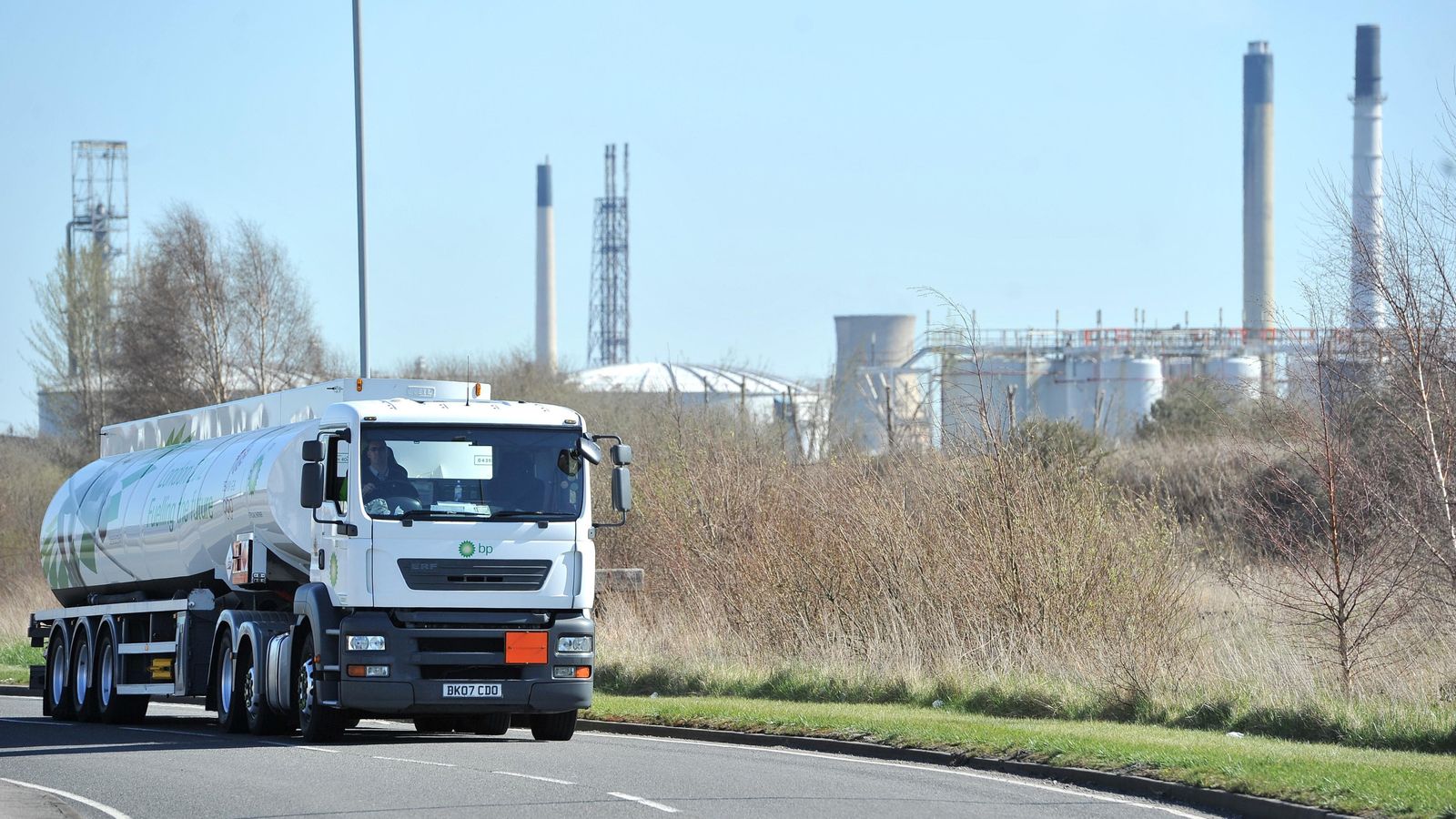The owner of the Stanlow oil refinery is facing a fresh financial crunch ahead of a looming deadline to repay hundreds of millions of pounds in deferred taxes.
Sky News has learnt that Essar Oil UK, which has owned the vast industrial site in north-west England for a decade, is grappling with a funding shortfall potentially running to hundreds of millions of pounds.
The company is seeking an extension to a ‘Time to Pay’ arrangement struck with HM Revenue & Customs in April in order to secure more breathing space.
Whitehall is understood to be monitoring the situation closely given the Stanlow refinery’s key status in the UK’s fuel production.
In total, roughly one-sixth of Britain’s transport fuels – equating to 4.4bn litres of diesel, 3bn litres of petrol and 2bn litres of jet fuel – are produced at the site.
It directly employs more than 900 people, with an additional 800 on-site contractors and a further 5000 people employed indirectly through the extended value chain
A spokesman for Essar Oil UK said on Friday that the company was due to repay $900m (£652m) at the end of this month, of which he said $700m (£508m) “is being paid”.
Dismal summer for retail as sales fall for fourth month in a row
Ministers to give workers immediate right to request flexible working
Travel hopes, retail slump, four-day week
Industry sources suggested, however, that the overall liability was in fact more than £1bn – part of which was not repayable until after the end of this month – and added that Essar Oil UK was trying to find a larger sum than that acknowledged by the company.
It was unclear on Friday whether HMRC would agree to any request for an extension from the refinery-owner.
The Official Receiver is said by industry sources to have been alerted to the current situation.
The funding squeeze marks the second time this year that Essar Oil UK has been forced into urgent talks about Stanlow’s future.
In April, the company and its advisers held talks with Whitehall officials about the future of Stanlow as the pandemic’s impact on revenues generated by the sale of aviation and road transport fuels hit Essar Oil UK’s funding position.
Essar Oil UK bought the site at Ellesmere Port from Shell in 2011, and has a direct pipeline which supplies Manchester Airport.
A spokesman for Essar Oil UK (EOUK) said the company had secured “total liquidity [of] $1.1bn (£798m)”, although it did not specify details about the sources or structure of that capital.
“EOUK also confirms it has met all its VAT repayments with HMRC up to now, but anticipates that it may need additional time to make payment of an amount originally deferred from May 2020, within the original time to pay schedule, in line with all other businesses during the pandemic.
“EOUK is in talks with HMRC to defer that payment as it continues to recover from the impact of the pandemic on its operations.
The spokesman said the company “returned to cashflow positive in July as volumes steadily increased”.
“We are confident in our future and our current liquidity position, but as a responsible corporate we need to plan for all eventualities, while the pandemic continues to impact us.”
A BEIS spokesperson said it did not comment on individual companies.
“The government put in place a far reaching package of support to help businesses across the economy during the pandemic, including the furlough scheme, loans and VAT deferrals.
“The government continually monitors fuel supply across the country to ensure the public do not see any disruption.”
Since the April talks with the government, Essar Oil UK has issued a series of upbeat statements, having promised in May to appoint two independent board members following the resignations of a number of professional advisers over corporate governance concerns.
One of those new directors has yet to be appointed, but the spokesman said on Friday that the company was “in talks” to do so.
Tim Bullock, a former BP executive, joined the Essar Oil UK board in July.
More recently, it announced that Deepak Maheshwari would become its third chief executive in little more than two years.






















